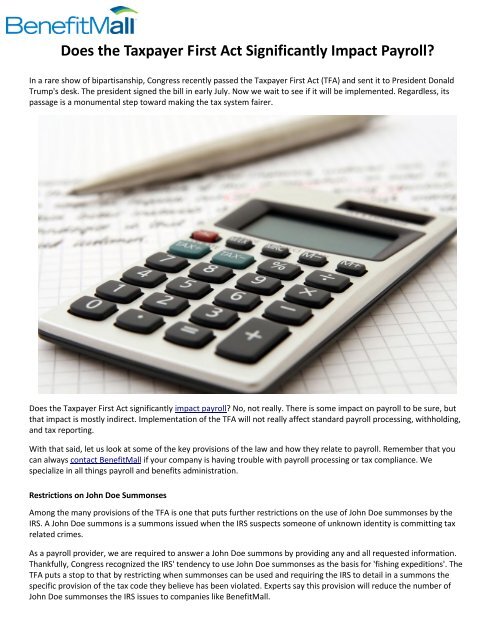Does the Taxpayer First Act Significantly Impact Payroll?
In a rare show of bipartisanship, Congress recently passed the Taxpayer First Act (TFA) and sent it to President Donald Trump's desk. The president signed the bill in early July. Now we wait to see if it will be implemented. Regardless, its passage is a monumental step toward making the tax system fairer. Visit: https://employers.benefitmall.com/Payroll-HR-Essentials
In a rare show of bipartisanship, Congress recently passed the Taxpayer First Act (TFA) and sent it to President Donald Trump's desk. The president signed the bill in early July. Now we wait to see if it will be implemented. Regardless, its passage is a monumental step toward making the tax system fairer. Visit: https://employers.benefitmall.com/Payroll-HR-Essentials
You also want an ePaper? Increase the reach of your titles
YUMPU automatically turns print PDFs into web optimized ePapers that Google loves.
<strong>Does</strong> <strong>the</strong> <strong>Taxpayer</strong> <strong>First</strong> <strong>Act</strong> <strong>Significantly</strong> <strong>Impact</strong> <strong>Payroll</strong>?<br />
In a rare show of bipartisanship, Congress recently passed <strong>the</strong> <strong>Taxpayer</strong> <strong>First</strong> <strong>Act</strong> (TFA) and sent it to President Donald<br />
Trump's desk. The president signed <strong>the</strong> bill in early July. Now we wait to see if it will be implemented. Regardless, its<br />
passage is a monumental step toward making <strong>the</strong> tax system fairer.<br />
<strong>Does</strong> <strong>the</strong> <strong>Taxpayer</strong> <strong>First</strong> <strong>Act</strong> significantly impact payroll? No, not really. There is some impact on payroll to be sure, but<br />
that impact is mostly indirect. Implementation of <strong>the</strong> TFA will not really affect standard payroll processing, withholding,<br />
and tax reporting.<br />
With that said, let us look at some of <strong>the</strong> key provisions of <strong>the</strong> law and how <strong>the</strong>y relate to payroll. Remember that you<br />
can always contact BenefitMall if your company is having trouble with payroll processing or tax compliance. We<br />
specialize in all things payroll and benefits administration.<br />
Restrictions on John Doe Summonses<br />
Among <strong>the</strong> many provisions of <strong>the</strong> TFA is one that puts fur<strong>the</strong>r restrictions on <strong>the</strong> use of John Doe summonses by <strong>the</strong><br />
IRS. A John Doe summons is a summons issued when <strong>the</strong> IRS suspects someone of unknown identity is committing tax<br />
related crimes.<br />
As a payroll provider, we are required to answer a John Doe summons by providing any and all requested information.<br />
Thankfully, Congress recognized <strong>the</strong> IRS' tendency to use John Doe summonses as <strong>the</strong> basis for 'fishing expeditions'. The<br />
TFA puts a stop to that by restricting when summonses can be used and requiring <strong>the</strong> IRS to detail in a summons <strong>the</strong><br />
specific provision of <strong>the</strong> tax code <strong>the</strong>y believe has been violated. Experts say this provision will reduce <strong>the</strong> number of<br />
John Doe summonses <strong>the</strong> IRS issues to companies like BenefitMall.
Restricted Contractor Access<br />
Ano<strong>the</strong>r provision of <strong>the</strong> TFA fur<strong>the</strong>r restricts contractor access to tax returns and taxpayer information. Such<br />
contractors are typically outside attorneys and o<strong>the</strong>r professionals assisting with cases too complex for a single attorney<br />
or law firm to handle. Prior to <strong>the</strong> legislation, any such contractors had unrestricted access to private information. That<br />
is no more.<br />
Contractors are no longer permitted access to any records or data obtained as a result of a summons unless <strong>the</strong>y can<br />
prove <strong>the</strong>y need <strong>the</strong> information in order to execute <strong>the</strong> services for which <strong>the</strong>y have been contracted. And even when<br />
given access to information, contractors are no longer allowed to question summoned witnesses.<br />
How does that affect payroll? It gives employees and payroll providers some additional peace of mind in knowing that<br />
information provided in response to a summons is not going to be openly distributed among contractors who have no<br />
need to see <strong>the</strong> information.<br />
Better Customer Service<br />
On a less serious note, but still equally important, is a provision that requires <strong>the</strong> IRS to develop new customer service<br />
standards that are in line with <strong>the</strong> private sector. Assuming <strong>the</strong> IRS implements this provision as intended, <strong>the</strong> days of<br />
getting <strong>the</strong> runaround when contacting <strong>the</strong> IRS will soon be over.<br />
Experienced payroll professionals are not calling <strong>the</strong> IRS for advice every o<strong>the</strong>r week. But <strong>the</strong>re are times – especially<br />
during <strong>the</strong> busy tax season – when contacting <strong>the</strong> IRS is unavoidable. It is about time <strong>the</strong> agency was forced to bring its<br />
customer service standards up to par. Good customer service is long overdue.<br />
There are many o<strong>the</strong>r provisions of <strong>the</strong> TFA that space does not allow us to discuss. We can say that <strong>the</strong> new law is<br />
nothing short of landmark legislation that tips <strong>the</strong> scales away from <strong>the</strong> IRS and more toward <strong>the</strong> taxpayer. That is <strong>the</strong><br />
way it ought to be. Don't you agree?



